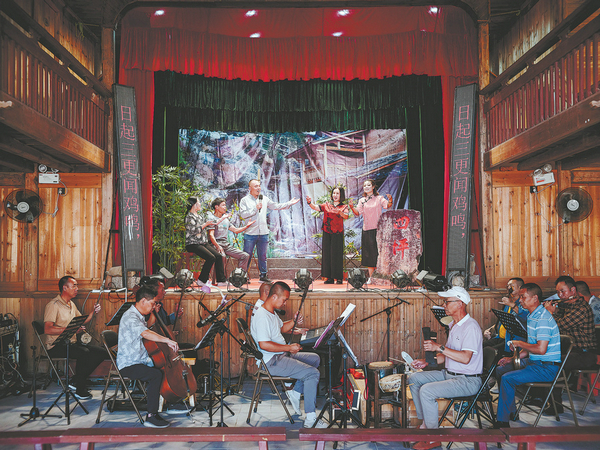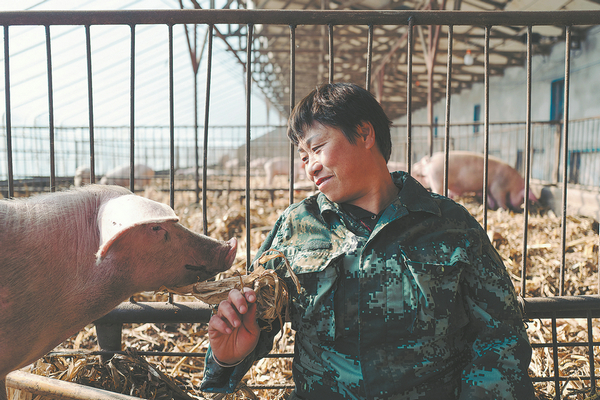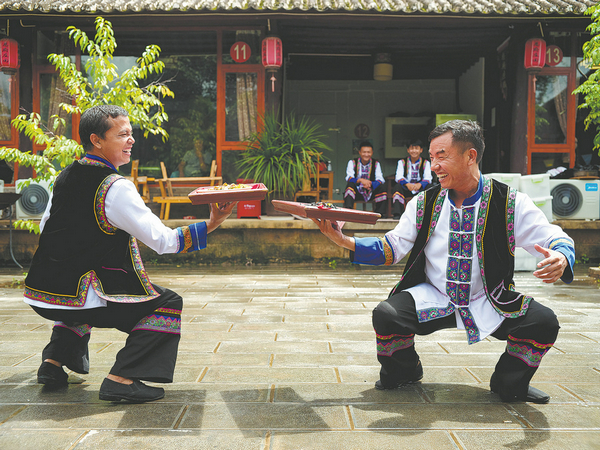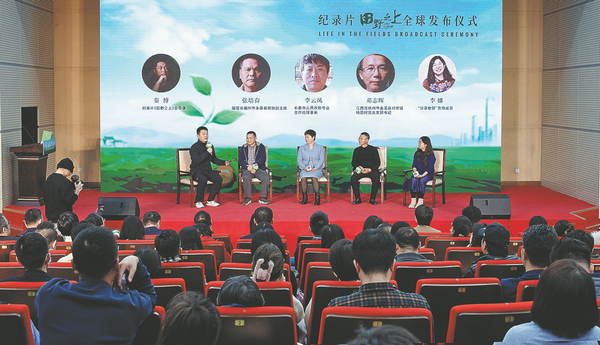
Residents of Siping village, Ningde, Fujian province, perform Pingjiang Opera, a traditional local art form. The documentary series Life in the Fields visited around 100 such villages across China to record contemporary rural life and the locals' stories. CHINA DAILY
The film crew of the documentary series Life in the Fields traveled through China, driving a car with the title painted on it, visiting around 100 villages.
For over a year, the crew was divided into 11 teams to settle in a village, recording the changes and the people who make them happen.
The crew's motto is that "everyone is a seed" — able to take root and sprout in the soil of the countryside — contributing their modest efforts in painting a vibrant picture of rural vitalization.
On Jan 7, the global broadcast ceremony for the six-episode documentary was held in Beijing. From that day, one episode is released every Tuesday on the video streaming platform Tencent Video and TV stations, including Dragon TV, Fujian Straits satellite TV and Southeast TV.
In anticipation of the upcoming Spring Festival, the documentary's pilot episode will be screened on the Fuxing high-speed trains. The Xuexi Publishing House will also launch audiovisual products related to the series.
Through six main themes — agriculture, ecology, culture, industry, talent, and comprehensive personal development — the series offers viewers an overview of contemporary Chinese countryside, rural life and the people who call it home.
At the broadcast ceremony, four representatives whose stories are featured in the documentary were invited to join director Qin Bo in a panel discussion to share their experiences and reflections.

Li Yunfeng, from Guojia village, Changchun, Jilin province, has been dedicated to sustainable pig farming. CHINA DAILY
Li Yunfeng, from Guojia village in Changchun, Jilin province, has dedicated more than two decades to pig farming. It has always been her dream that the ways of production and life in the village could change and that younger generations would be willing to stay in the village.
"I'm 55, yet I'm considered young in the village. This worries me. Who will grow the crops when there are no young people left? The land that everyone depends on for survival will be abandoned. We must create an environment where young people can enjoy rural life," Li says.
Sustainability is a concern as she aims to produce healthy food without chemical fertilizers or pesticides. She first encountered fermented bed pig farming during a training session in 2005, where pigs are raised on a thick layer of bedding comprising agricultural by-products like corn stalks and rice husks.

Two performers from Yi ethnic group showcase a folk dance that involves holding dishes. CHINA DAILY
Microorganisms in the fermented bed decompose and absorb pig waste into organic fertilizer, providing essential nutrients for the soil, which not only saves water, feed and labor but also minimizes odor and waste.
She dedicated herself to studying and improving the technique, developing a version that suited local farming conditions, and obtaining a patent.
Her success didn't stop there. Because groundwater is interconnected, she knew that if only her household avoided using chemicals while her neighbors continued to do so, her efforts would be in vain. Therefore, she tirelessly persuaded other villagers to adopt the organic method.
"At first, convincing villagers to raise pigs in eco-friendly ways was incredibly difficult. When I told them that raising pigs wouldn't smell bad and wouldn't require cleaning up manure, they thought I was talking nonsense. So I traveled around the country and gave talks. Now, I have hundreds of trainees following my method in more than 20 provinces," Li says.
Having proven the advantages by her example and expanding her influence, the Guojia villagers gradually transitioned to sustainable pig farming.
"Our village has undergone a tremendous transformation. Over the past few years, 30 to 40 young people have returned. The villagers are highly engaged in sustainable agriculture," Li says.
Deng Zhihui, Party secretary of Yangtian village in Fuzhou, Jiangxi province, is equally concerned about the imbalanced age demographics in rural areas.
Deng initially worked as the village doctor for more than 20 years. In 2021, he was elected as an official by the villagers out of trust and support.

Tree planters work to turn barren land into an oasis. CHINA DAILY
He has been working to improve the villagers' well-being, including setting up a community canteen for the elderly, ensuring that the 21 elderly villagers living alone need not worry about daily meals. The village also set up a center for 36 left-behind children, with employees providing care and companionship during weekends and holidays.
"There is a saying, 'Who would leave their hometown if not for the burden of life?' As the village secretary, my greatest responsibility is to create an environment more conducive to young people, so they will return to the village," Deng says.

Director Qin Bo (first from left) takes part in a panel discussion with four representatives featured in the documentary. CHINA DAILY
Qin says that having firsthand experience with rural regions, he deeply resonates with Deng's vision: "When we hear about developing the economy in small cities and towns through national policies, we might not directly feel the impact but in fact, it means more people can work locally and stay close to their families, creating better living conditions."
According to him, the documentary aims to authentically present the unfolding stories and experiences of the people in the villages, allowing viewers to witness remarkable transformations in rural China.
"We hope that viewers will see the stories and changes. When the opportunity arises, they can visit these villages and perhaps contribute to rural vitalization," Qin says.
While keeping an objective lens during filming and showing different sides of each subject, the relationships between people continue to emerge in front of and behind the camera. After filming, many subjects became friends with the crew members.
"We hope this project will be a continuous endeavor, and that we can keep recording the stories of villages across the country. Rural vitalization is an ongoing story rather than an end. We need to continue documenting it," he adds.

A crew member interacts with a local resident during filming. CHINA DAILY

The documentary series hosted a global broadcast ceremony on Jan 7. CHINA DAILY